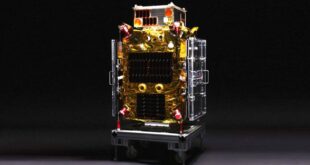
Kazakhstan and Russia have recently concluded one of their periodic renegotiations of the Russian lease of the Baikonur Cosmodrome located on the Kazakh steppe, and the workhorse of Russia’s launch schedule, with significant implications for Kazakhstan’s space ambitions, according to analysis provided by Anna Gussarova in the Eurasia Daily Monitor published by U.S. think tank, The Jamestown Foundation.
According to Gussarova, the Kazakh-Russian renegotiation of the Baikonur lease has resulted in Russia handing over 67.3 square kilometers of the Cosmodrome to include two Zenit-M launch pads. This new amendment to Russia’s Baikonur lease was concluded earlier in May 2018, and comes just as Kazakhstan is about to release its new ambitious space policy in May 2018, with its Ministry of Defence and Aerospace Industry concluding a review and assessment of Kazakh interests in the rapidly changing space domain.
Gussarova writes that, “Although Kazakhstan is host to the world’s largest cosmodrome, until now the country has never possessed its own space launch infrastructure as Baikonur has been leased entirely by Russia since the collapse of the Soviet Union. Russia will continue to lease Baikonur—minus the aforementioned transferred portions—for [U.S.]$115 million annually until 2050.”
The Kazakh acquisition of the two Zenit-M launch pads at Baikonur may appear to be beneficial to Kazakh space ambitions, but in reality, Gussarova argues, they might instead prove to be an expensive hindrance that ties those ambitions to Russia’s space launch industry’s vested interests.
“But in reality, the only opportunity for the country to use this Zenit-M ground infrastructure will be to participate in joint projects with Russia,” writes Gussarova. ” [W]hich owns and operates the actual rockets for these launch complexes. Specifically, these facilities will be used to launch the new Russian Soyuz-5 rockets. Thus, two countries agreed that Russia plans to develop the Soyuz-5 and Kazakhstan will be in charge of modernizing the older Zenit rockets. The feasibility study of upgrading the infrastructure at Baikonur is still ongoing. But according to estimates, the modernization of the Zenit launch pads will cost the Kazakhstani budget approximately [U.S.]$245 million.”
The recent Kazakh-Russia Baikonur agreement essentially commits Kazakhstan to covering the costs of modernising the two Zenit-M launch pads (launch pads that Kazakhstan could not operate autonomously without access to the Russian-owned launch range capabilities of the rest of the Baikonur Cosmodrome) and essentially tieing its future space launch ambitions to Russian launch vehicles and policy priorities, such as the development of the Soyuz-5 and Phoenix launch vehicles, with the former getting its maiden launch in 2022, and the latter in 2035.
Gussarova also suggests that among Kazakhstan’s space ambitions is the establishment of a National Space Centre that includes a satellite integration and test facility, suggesting that ultimately Kazakhstan plans to manufacture its own satellites. Gussarova concludes her analysis as follows:
“Russia’s upcoming transfer of certain Baikonur launch facilities to Kazakhstan will make the two countries’ space programs even more dependent on each other. It is obvious that Russia will not leave Baikonur until 2050. Whereas, the Kazakhstani government hopes to complete Baiterek and establish its own space industry. But Astana’s current strategy means that even if rockets are soon launched from Kazakhstani-owned launch pads, those rockets will be Russian.”
 SpaceWatch.Global An independent perspective on space
SpaceWatch.Global An independent perspective on space




